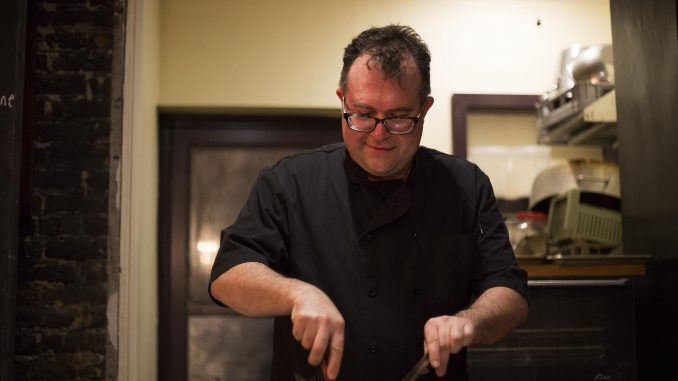
Keith Wallace’s introduction to the restaurant business began when he forged his work permit to work as a dishwasher at age 13.
“The best thing I ever ate was probably spaghetti and meatballs by that point,” Wallace said. “When one of the chefs gave me a prepared meal for the first time, it was pasta with garlic. I had never tasted garlic before that moment, so that was a revelation.”
Today, Wallace serves as the owner and founder of the Philly Beer School and the Wine School of Philadelphia at Chestnut and S. 22nd streets, where he teaches classes revolving around food pairings and the composition of wine and beer.
While seeking a college degree in English at Salem State University, Wallace worked as a cook, eventually rising to the rank of sous chef. However, Wallace left the food business after graduation to pursue his love of writing, working as a journalist for outlets like The Baltimore Sun and National Public Radio Boston.
Reporting in Baltimore during the United States’ crack epidemic of the early 1990s was an experience that he found rewarding but harrowing. He would often carry a fake wallet and hide money inside his socks when on assignments.
“I got shot at a few times, I had pit bulls unleashed on me at one point. But I also got to meet pretty much every single governor in the United States,” Wallace said. “I actually met national politicians including Al Gore and little Bush back before he was president.”
Without the pressure of holding a career in the culinary industry, Wallace rediscovered his passion for food and drink and moved to Philadelphia to work as a wine consultant for local and overseas vineyards, earning a degree in viticulture from the University of California, Davis in 1999. Soon after the move, he opened the Wine School in 2005.
Despite an initial aversion to public speaking, Wallace found he had a natural talent for teaching after a client encouraged him to instruct a class.
“My mom is a schoolteacher and my father is a minister, both of who talk for a living in front of people,” he said. “What I realized is I actually had that ability, and not only did I have it but I actually liked being able to give people [advice]. … I felt that I actually could contribute something of value.”
When it comes to pairings, Wallace stresses the importance of three main ingredients in wine—acids, which help give wine its fruity flavor and sourness, tannins, which affect bitterness, and alcohol levels, which determine how well the drink will match with spicy foods.
“It is just purely chemistry,” he said. “And you think about wine not as how it tastes, but what it’s composed of.”
For highly acidic white wines, Wallace suggests an accompaniment of salty dishes and to stray away from other acidic foods, like Caesar salads. Steak, hard cheeses and other dishes with high levels of fat and proteins are what let red wines really “sing,” he said.
Beers tend to blend well with spicier foods due to their low alcohol content in comparison to wine, and residual sugars left from the brewing process work to round out the flavor. Wallace endorses Sauvignon blanc and Pinot noir as universal wines, which tend to work and pair well with the majority of foods.
2010 broadcasting, telecommunications and mass media alumnus Neil Ross, a student at the Wine School and beverage director of the Aegean Restaurant Group, is also fascinated with the science and research involved with wine pairings. Ross uses his past culinary experience and knowledge from the Wine School to educate staff members at Estia, a Greek fishouse restaurant owned by the group, on the ins and outs of alcohol and food pairings, in an effort to create a “gastronomic harmony,” for the guest.
“I think that in the world of gastronomy in general, there needs to be a lot of research,” he said. “The cool thing about Philadelphia is there are a lot of people doing it. If you go to somewhere like Vernick, their preparation and their research, all the ingredients that they use, from cocktail to food, they’re very careful in the ingredients that they select. It’s sort of like you’re creating a harmony in everything that you do.”
All science aside, Wallace emphasizes that presentation is “99 percent of everything.”
“We eat with our eyes,” he said. “You can present something, and it can be the best meal in the world, but if it’s just gray or if it’s just haphazard on the plate, your brain is going to say, ‘This is s–t.’”
For Wallace, the most rewarding parts of his trade come from watching his students succeed and earning the respect of the wine community—both nationally and internationally.
“When we were in France, the winemaker’s wife invited us in for dinner, and there’s like 10 of us, and just cooks us dinner,” he said. “These are people who are famous in the wine theater, they’re well respected and they’ll just open their doors for us and invite us in. Things like that are just amazing.”
“Every day I go to class with Keith, I realize I don’t know anything,” Ross said. “There’s such an amazing world out there that I’ve only begun to scratch.”
In the future, Wallace hopes the city’s wine community can band together to make his passion more accessible.
“The wine trade is supposed to be about community, it always has been,” he said. “There’s a small group of people in Philly that just want everything for themselves. … We drink for a living. No one should be angry.”
“Everything tastes better when you’re happy.”
Eamon Dreisbach can be reached at eamon.noah.dreisbach@temple.edu.


Be the first to comment